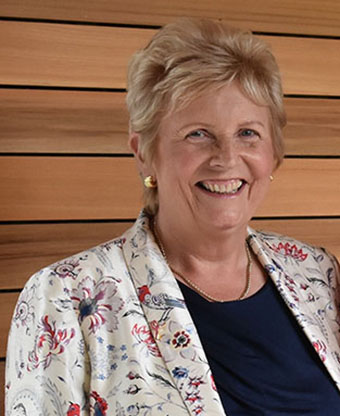Director
Email: l.j.fallowfield@sussex.ac.uk
Tel (UK): 01273 873015
Tel (International) +44 1273 873015
Prof Dame Lesley Fallowfield
Lesley Fallowfield trained at Guy's Hospital London as a nurse before completing a degree in Experimental Psychology. Research for her DPhil in Psychophysics was done at the Universities of Sussex and Cambridge. Her primary research interests include:
- Assessment of Patient Reported Outcomes (PROs)in clinical trials of cancer therapy. Development and assessment of supportive interventions for symptoms and side-effects of cancer and its treatment.
- Communication- development and evaluation of innovative training course and materials to assist health care professionals' communicating with patients, their families and with clinical colleages.
Professor Fallowfield has contributed numerous articles to medical journals and has written three textbooks on QoL and communication in health care.
- TARGET2
New series of workshops due to begin September 2024
- TRUSTING AZ Workshops 2025
A series of workshops around the UK building on the previous workshops but incorporating new materials covering extra topics and scenarios.
- BRCA Direct 2
Following on from the successful BRCA DIRECT trial, NHS England has provided funding to implement the BRCA DIRECT digital pathway in 10-20 centres in England over an 18 month period.
- LORIS
A phase III trial of surgery versus active monitoring for Low Risk DCIS (LORIS), incorporating a two year feasibility study. The aim of the main trial is to determine whether women with newly diagnosed low risk DCIS can safely avoid surgery, without detriment to their psychological well-being and can those patients who do require surgery be identified by pathological and radiological criteria.
- POSNOC
A randomised controlled trial of axillary treatment in women with early stage breast cancer who have metastases in one or two sentinel nodes. The aim of this trial is to determine whether axillary clearance or radiotherapy can be safely avoided in women receiving chemotherapy and/or hormone therapy following surgery for early stage breast cancer. The trial also explores how aspects of QoL and psychological well-being are affected by fear of cancer recurrence and long term side effects of axillary treatment.
- TARGET2
A new series of TARGET workshops commisioned by Exact Sciences.
- TRUSTING AZ Workshops 2025 Evaluation
Evaluation of a series of workshops around the UK building on the previous workshops and incorporating new materials covering extra topics and scenarios.
- HearSay
Development and implementation of training program from Healthcare Professional on how best to communicate with patients who have metastatic disease.
- CANCODE
In order to develop an educational programme to help communication professionals working with d/Deaf and deaf-blind people (e.g. sign language interpreters) better understand what they may be required to interpret in cancer consultations, we are conducting a survey to find out what communication professionals feel are the biggest challenges when working in cancer consultations.
- Starkings, R., Fallowfield, L., Russ, S. & Jenkins, V. (2025). Qualitative Findings From a Survey Measuring Informational Needs and Quality of Life of Women Living With Metastatic Breast Cancer. Psycho-Oncology, 34: e70177. https://doi.org/10.1002/pon.70177 Find it online here 10/05/2025
- Harder H, Starkings R, Fallowfield L, May S, & Shilling V. (2025) Incidence and management of diarrhoea associated with abemaciclib and endocrine therapy for hormone-receptor positive, HER2-negative metastatic breast cancer: the UK patients' experiences. Support Care Cancer 33, 422. Find it online here 26/04/2025
- Starkings R, Harder H, Fallowfield L, Shilling V. (2025) Exploring the real-world experience of abemaciclib treatment for HR +, HER2- metastatic breast cancer - a qualitative analysis of the IMPACTOR study. Supporive Care in Cancer; 33 (421). Find it online here 26/04/2025
- Fallowfield L, Transforming Treatment Pathways: Integrative Strategies in Palliative Care for Metastatic Breast Cancer, - Medscape - April 17, 2025 Find it online here 17/04/2025
- Fallowfield L, Solis-Trapala I, Starkings R, Matthews L, May S, Jenkins V. Improving patient understanding of GEP test results (IMPARTER4): an RCT. BMJ Oncology 2025;4:e000689. doi:10.1136/bmjonc-2024-000689 Find it online here 24/03/2025
- Torr B, Kavanaugh G, Hamill M, Jones C, Harder H, Allen S, ..., Turnbull C.(2025) Uptake, utility and resource requirements of a genetic counselling telephone helpline within the BRCA-DIRECT digital pathway for mainstreamed BRCA testing in patients with breast cancer. Journal of Medical Genetics. (2025;0): 1-9. Find it online here 12/03/2025
- Wheelwright S, Minton O, Absolom K, Fairvre-Finn C, Fallowfield L, Gilbert ...Shilling V. (2025) Integrating ePROMs: A Key Opportunity for England's National Cancer Plan. Journal of Cancer Policy (44): 100575 Find it online here 10/03/2025
- Shilling, V., Starkings, R. & Fallowfield, L. Feasibility and acceptability of a virtual learning module for navigating angry conversations in clinical encounters. BMC Med Educ 25, 167 (2025). https://doi.org/10.1186/s12909-025-06726-6 Find it online here 01/02/2025
- Bedia J, Jacobs I, Ryan A, Gentry-Maharaj A, Burnell M, Singh N ... Skates S. (2025) Estimating the ovarian cancer CA-125 preclinical detectable phase, in-vivo tumout doubling time, and window for detection in early stage: an exploratory analysis of UKCTOCS. eBioMedicine, 112: 105554 Find it online here 14/01/2025
- Torr B, Jones C, Kavanaugh G, Hamill M, Allen S, Choi S et al. (2024)BRCA-DIRECT digital pathway for diagnostic germline genetic testing within a UK breast oncology setting: a randomised, non-inferiority trial. British Journal of Cancer 131, 1506-1515. Find it online here 01/10/2024

